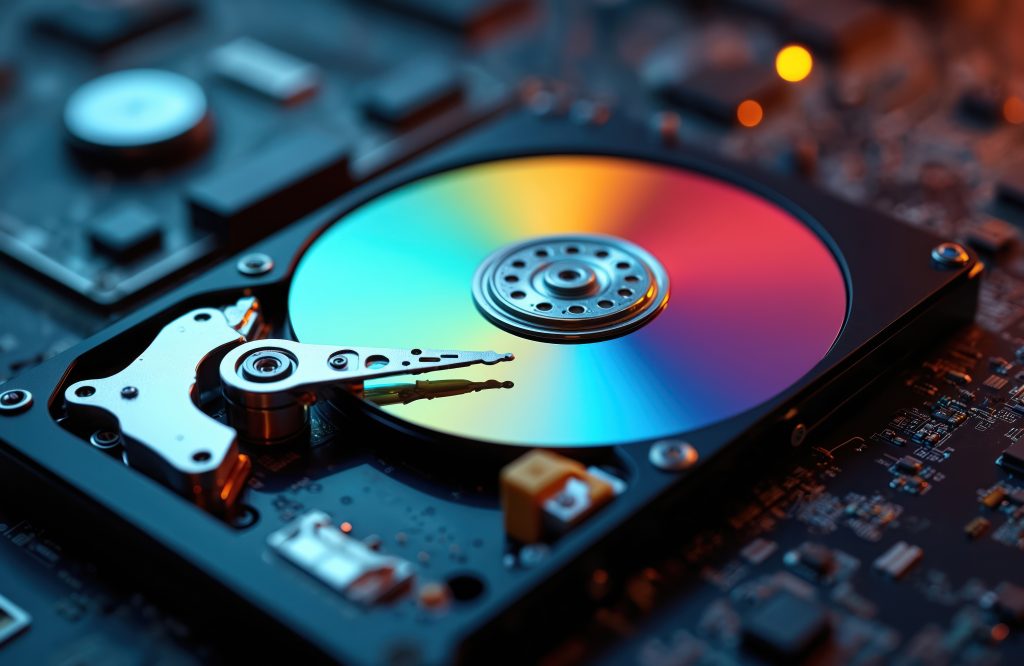
A fast computer is essential for both work and leisure. One effective way to enhance your PC’s performance is by choosing the right storage and memory option: SSD or HDD. Understanding the differences between these two can significantly impact your computing experience.
Deciding between an SSD (solid state drive) and an HDD (hard disk drive) can be daunting if you’re unfamiliar with their differences. This guide will explain their key aspects, including performance, durability, cost, and environmental impact, so you can make an informed choice.
SSD vs HDD: What’s the Difference?
Let’s start by defining these storage types:
- SSD (solid state drive): Uses flash memory for data storage, similar to USB drives. With no moving parts, SSDs offer faster data access and retrieval.
- HDD (hard disk drive): Stores data on spinning disks, using a mechanical arm to read and write. This technology has been used for decades.
The main differences between SSDs and HDDs are in their design and functionality:
- Durability: SSDs are more durable due to the absence of mechanical parts.
- Cost: HDDs are generally more affordable per gigabyte, making them a budget-friendly choice for larger storage needs.
To explore the evolution of data storage, visit the Memory & Storage Timeline.
Performance: SSD vs HDD
When it comes to speed, the choice between an SSD and an HDD can make a big difference:
- Faster data access: SSDs provide quicker data access and boot times compared to HDDs, thanks to their flash memory technology.
- Enhanced PC performance: SSDs improve overall PC performance, making tasks like opening programs and moving files faster.
- Improved user experience: For gamers and developers, SSDs offer faster load times and smoother software performance.
If speed is your priority, opting for an SSD can significantly enhance your PC’s performance.
Durability and Reliability
Choosing between an SSD and an HDD also involves considering durability and reliability:
- Durability: SSDs, without moving parts, are generally more durable than HDDs, which are susceptible to physical damage.
- Reliability: SSDs offer better data retention and a longer lifespan in terms of read/write cycles.
Cost Considerations
Cost is a key factor when choosing between an SSD and an HDD:
- Price per gigabyte: HDDs have traditionally been cheaper, but the price gap is closing as SSD technology advances.
- Cost: SSD prices have decreased over the years, making them more accessible to users. The type of SSD (e.g., SATA vs. NVMe) affects the price, with NVMe offering superior speed at a higher cost.
Consider your budget and storage needs when deciding. For high-speed tasks like gaming or video editing, an SSD is worthwhile. For large storage at a lower cost, an HDD may be better.
Environmental Impact
Environmental considerations are increasingly important. Here’s how SSDs and HDDs compare:
- Energy consumption: SSDs use less power than HDDs, reducing electricity bills and carbon footprint.
- Material usage: SSDs are more compact, requiring fewer materials, which reduces environmental impact.
- Sustainability: SSDs offer a more sustainable option due to their energy efficiency and longer lifespan.
For more on environmental impacts, visit Greenly. Consider sustainability alongside performance and cost when choosing storage.
Future Trends in Data Storage
Data storage is evolving, with exciting advancements on the horizon:
- Increased storage density: Innovations are leading to more compact and efficient storage solutions.
- Energy efficiency: Future storage solutions will consume less power, reducing environmental impact.
- AI and machine learning: Future systems may offer smarter data management and performance optimization.
- Cloud storage expansion: Expect more seamless integration between local and cloud storage.
- Quantum storage: Though early, quantum storage holds potential for revolutionary speed and capacity.
Explore more on future trends at TechTarget.
Recommendations
Choosing between an SSD and an HDD depends on performance, cost, and environmental factors. Here’s a quick recap:
- Performance: SSDs boost PC performance, ideal for gaming and demanding tasks.
- Durability and reliability: SSDs are more durable and reliable.
- Cost: SSDs are pricier per gigabyte, but prices are decreasing.
- Environmental impact: SSDs are more energy-efficient and sustainable.
Choose based on your needs and budget. To further enhance your PC’s performance, consider using iolo’s System Mechanic®. This tool can improve speed, maintain drive health, and ensure smooth computing. For more tips, explore 5 tips on how to make an old computer faster.








